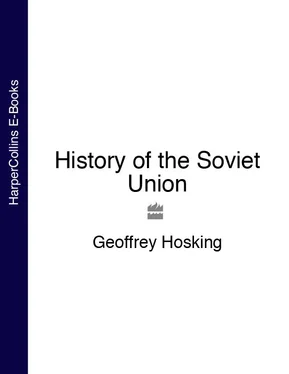At any rate, it looked as if economic development would have to come out of Russia’s own resources. The Opposition, which was beginning to crystallize around Trotsky, felt this could only be done through rigorous state planning and the diversion of resources from the private sector to feed heavy industry. The manufactured products thus created would feed into all sectors of the economy, including consumer industry and agriculture, and would ultimately make them all more productive. Admittedly, there would probably be some years of austerity, while consumption was cut in order to concentrate resources on industrial investment. The Opposition’s main economic spokesman, Evgeny Preobrazhensky, even called this process ‘primitive socialist accumulation’, and likened it to the ‘primitive capitalist accumulation’, which Marx had described in Capital . He argued, however, that it would be far less objectionable than the capitalist variety, since (a) it would bear mostly on the ‘bourgeois’ sector of the economy, and (b) the surplus value generated would be used for the ultimate benefit of everyone, not just for the conspicuous consumption of the few.
The Oppositionists were moved by a dislike of NEP which was widely shared in the party. They were repelled by the raucous, untidy, money-grabbing peasant markets, by the debauchery of the nightclubs, by the furs and silk dresses at the theatre, all to be seen again just as if the revolution had never taken place. Even prostitutes had reappeared on the streets. Preobrazhensky warned, with Trotsky’s support, that if the socialist sector of the economy were not given deliberate advantages, then the country was in danger of being dominated by kulaks and nepmen (as the traders, retailers and small manufacturers were contemptuously known). Fast industrialization, on the other hand, would enable agriculture to be mechanized, and this in turn would draw the peasants into collective farms, as Lenin had recommended. ‘Only a powerful socialized industry can help the peasants transform agriculture along collectivist lines,’ Trotsky argued in the Opposition’s platform of September 1927.
Spokesmen for NEP were quick to point out the drawbacks in the Opposition programme. ‘Squeezing the private economy’ meant above all squeezing the peasantry: might the result not be the same as during the civil war–severe shortages and the revival of the black market? If Russia was now really on its own, could the nation afford a policy which would endanger the relatively smooth trading arrangements between town and country created by NEP? Or, to put it in Leninist terms, was it prudent to jeopardize the ‘alliance between the proletariat and peasantry’ which had made the October revolution possible? In his Testament Lenin had warned: ‘Our party rests upon two classes, and for that reason its instability is possible, and if there cannot exist an agreement between those classes its fall is inevitable.’
Конец ознакомительного фрагмента.
Текст предоставлен ООО «ЛитРес».
Прочитайте эту книгу целиком, купив полную легальную версию на ЛитРес.
Безопасно оплатить книгу можно банковской картой Visa, MasterCard, Maestro, со счета мобильного телефона, с платежного терминала, в салоне МТС или Связной, через PayPal, WebMoney, Яндекс.Деньги, QIWI Кошелек, бонусными картами или другим удобным Вам способом.












